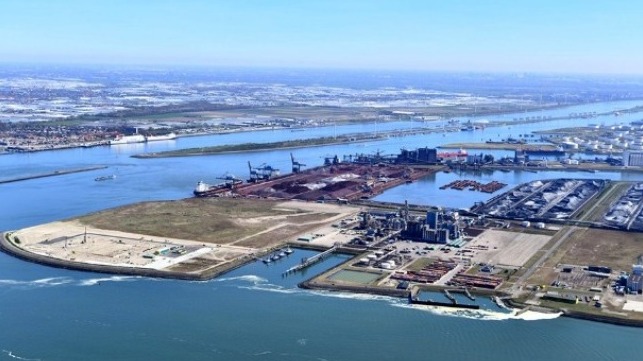Rotterdam and German Steel Companies Explore Hydrogen Infrastructure

Two of Germany’s leading steel manufacturers are joining with the Port of Rotterdam to jointly investigate developing an international supply chain for hydrogen passing through the port as a replacement for the coal currently used in their manufacturing operations. The companies recognize that vast imports of hydrogen would be required if Europe and Germany want to reduce CO2 emissions by replacing current fuel sources and become climate-neutral by 2050 while maintaining its strong industrial backbone.
Thyssenkrupp Steel and Hüttenwerke Krupp Mannesmann (HKM), both operating in the Duisburg region of Germany, have for decades been importing coal, iron ore, and other raw materials via their terminal in Rotterdam. The materials are transshipped using inland barges, as well as rail, to transport the raw materials to their manufacturing plants in Germany. With a production volume of approximately 11 million tons annually, thyssenkrupp Steel is the largest flat steel producer in Germany while HKM accounts for approximately 12 percent of the German market producing about four to five million tons of steel in a year.
As part of their efforts to transform towards climate-neutral steel making, both companies are exploring the use of hydrogen to replace coal in their current processes. However, to achieve this, they will require an increasingly large amount of hydrogen and a strong infrastructure to meet their manufacturing needs.
The three partners agree that new, cross-border infrastructure is required to support the energy transition. Together, they are exploring the opportunities to import hydrogen via Rotterdam as well as a possible pipeline corridor between Rotterdam and thyssenkrupp Steel’s and HKM’s steel sites in Duisburg.
This new project aligns with other efforts underway at the Port of Rotterdam exploring future opportunities in hydrogen. The port is already investigating the import of hydrogen from a large number of countries and regions all over the world. Port officials believe that a strong trade can be built for hydrogen as a sustainable alternative to coal, oil, and natural gas with Rotterdam emerging as the hub for the new infrastructure.

that matters most
Get the latest maritime news delivered to your inbox daily.
At the end of 2020, the Port of Rotterdam joined a project with Germany and Australia looking at how the value chain for renewable hydrogen can be developed globally. Among the elements the two-year feasibility study is looking at is the shipment of hydrogen from Australia to supply Germany and Europe with renewables sources of energy. The Port of Rotterdam is exploring the development of a hydrogen shipping hub that could be used to supply European industry.
The Port of Rotterdam and German energy company Uniper are also undertaking a feasibility study to investigate the possibilities of large-scale production of green hydrogen in the Maasvlakte area in Rotterdam. The study, which will be completed this summer, will explore leveraging the strong resources of the region to become a leader in the commercialization of green hydrogen. Uniper is exploring using its current site in Rotterdam to become a manufacturing center using the area’s natural resources for the production of green hydrogen.
